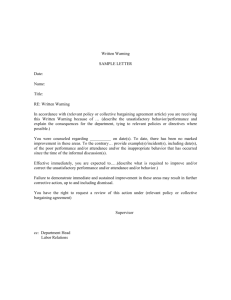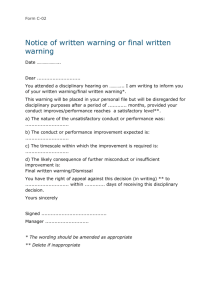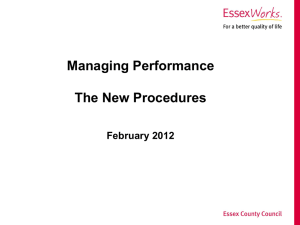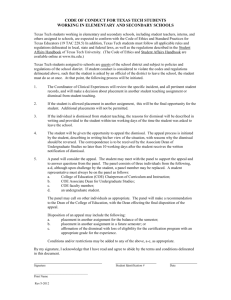Capability Policy and Procedure
advertisement
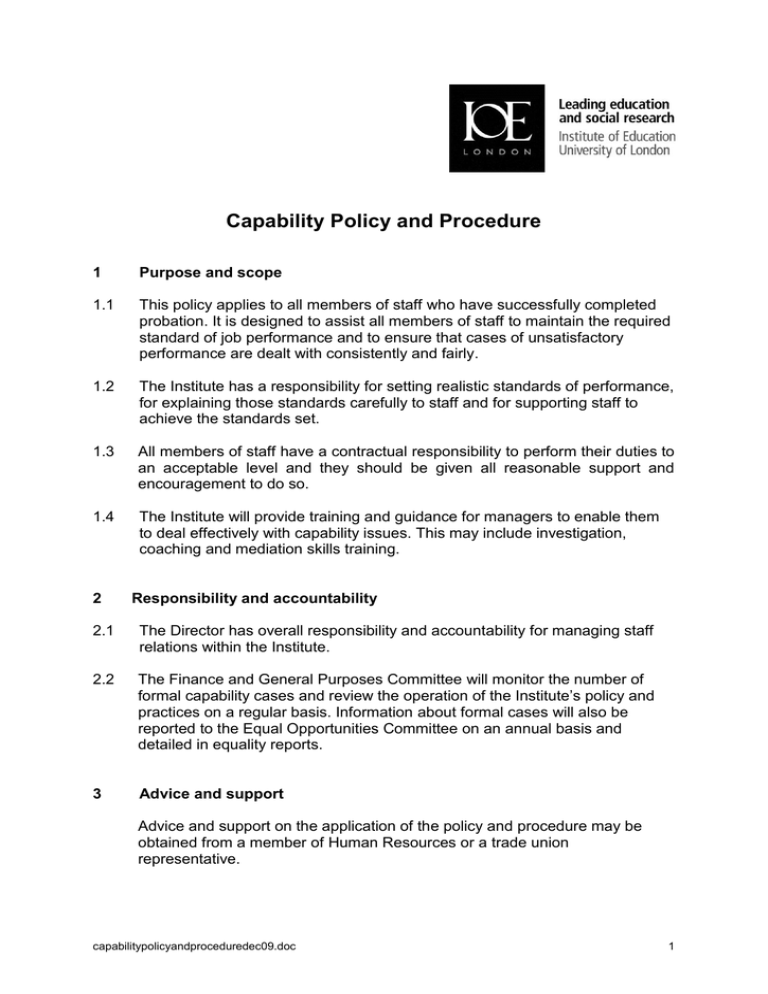
Capability Policy and Procedure 1 Purpose and scope 1.1 This policy applies to all members of staff who have successfully completed probation. It is designed to assist all members of staff to maintain the required standard of job performance and to ensure that cases of unsatisfactory performance are dealt with consistently and fairly. 1.2 The Institute has a responsibility for setting realistic standards of performance, for explaining those standards carefully to staff and for supporting staff to achieve the standards set. 1.3 All members of staff have a contractual responsibility to perform their duties to an acceptable level and they should be given all reasonable support and encouragement to do so. 1.4 The Institute will provide training and guidance for managers to enable them to deal effectively with capability issues. This may include investigation, coaching and mediation skills training. 2 Responsibility and accountability 2.1 The Director has overall responsibility and accountability for managing staff relations within the Institute. 2.2 The Finance and General Purposes Committee will monitor the number of formal capability cases and review the operation of the Institute’s policy and practices on a regular basis. Information about formal cases will also be reported to the Equal Opportunities Committee on an annual basis and detailed in equality reports. 3 Advice and support Advice and support on the application of the policy and procedure may be obtained from a member of Human Resources or a trade union representative. capabilitypolicyandproceduredec09.doc 1 4 Informal stage 4.1 Cases of unsatisfactory performance are usually best dealt with informally and the aim should always be to achieve the desired improvement in performance without taking formal action. 4.2 Where there is a possibility that a member of staff is not performing at an acceptable level, the line manager should investigate the circumstances without delay and endeavour to ascertain the reasons for this. If, following the examination, the manager considers that the individual’s performance is not adequate in some material respect, an informal discussion should be arranged. 4.3 At this meeting the manager should make clear the areas in which the member of staff’s performance is below expectation and give the grounds/evidence for this view. Any reasons for the unsatisfactory performance should be explored with the member of staff. Solutions to the problem could involve additional training, providing a mentor, coaching or some other kind of on-going support to the individual. The line manager should bear in mind the provisions of the Disability Discrimination Act (if applicable), particularly the obligation to make reasonable adjustments. A reasonable time frame within which improvement is expected should be set and a further meeting arranged at the end of this time to review the situation. When establishing reasonable timescales for improvement, managers must consider the complexity of the tasks involved in relation to the qualifications and experience of the member of staff. 4.4 The content and outcome of the meeting will be confirmed in writing to the member of staff by the manager, outlining the type of improvement required, any additional support or training that will be provided, any other agreed actions and the timescale for improvement and review. The member of staff will also be advised that in the absence of the required improvement it might be necessary to take formal action which could result in an improvement note, equivalent to a first written warning. 5 Formal - Stage One 5.1 If the informal action does not result in the required improvement, or the unsatisfactory performance is considered sufficiently serious to warrant formal action (eg where health and safety is at risk or costs and other liabilities are involved), then the member of staff should be invited to a formal interview to discuss the matter. 5.2 At this meeting the member of staff will have the opportunity to explain her/his unsatisfactory performance and to raise any concerns she/he has about the job or the support and guidance she/he has been given to do it. 5.3 Further consideration should be given to any additional training or support that could reasonably be provided to enable the member of staff to reach the capabilitypolicyandproceduredec09.doc 2 required standard of performance. A reasonable time period will be set within which improvement is expected and a further meeting arranged at the end of this time to review the situation. 5.4 The content and outcome of the meeting will be confirmed in writing and the member of staff advised that this constitutes an improvement note, equivalent to a first written warning. This warning will be kept on the member of staff’s HR file but will be disregarded after the specified period (normally six months), subject to the member of staff achieving and sustaining satisfactory performance. 6 Formal - Stage Two 6.1 If the unsatisfactory performance is sufficiently serious or if, during the currency of a prior warning, the required improvement in performance is not achieved, a (further) formal interview will be held. 6.2 At this meeting the relevant manager will review the history of the case, including the steps taken to support the member of staff, and undertake any further investigation. If, having heard the explanation offered by the member of staff, the manager remains concerned about the member of staff’s performance, a final written warning will be issued. 6.3 Further consideration should be given to any additional training or support that could reasonably be provided to enable the member of staff to reach the required standard of performance. A reasonable time period will be set within which improvement is expected and a further meeting arranged at the end of this time to review the situation. 6.4 This warning will be kept on the member of staff’s HR file but will be disregarded after the specified period (normally 12 months), subject to the member of staff achieving and sustaining satisfactory performance. The member of staff will be advised that failure to reach the required standard within a specified time may lead to dismissal (or some other action short of dismissal). 7 Formal - Stage Three 7.1 If the required improvement in performance is still not achieved within the timescale following the final warning, or the unsatisfactory performance is so serious to be considered as gross incompetence, the case will be referred to a Panel hearing for potential dismissal. 7.2 The case will be heard by a Panel authorised by the Director consisting of three people not previously involved in the case. For members of staff covered by the Statutes, the Panel will comprise the Director or her/his nominee, a nominee of Senate and a lay member of Council and the Panel’s reasoned decision in writing will be reported to Council. capabilitypolicyandproceduredec09.doc 3 7.3 The member of staff shall be informed of the complaint and shall be entitled to be present, to hear the evidence and to call relevant witnesses. 7.4 The Panel may decide that the member of staff be dismissed or that some other action short of dismissal, such as withholding of any forthcoming increment in salary, suspension without pay for up to three months and/or reduction in grade and/or loss of title be taken. These sanctions may only be applied if allowed for in the member of staff's contract or with the member of staff’s agreement. 7.5 The Director of Administration or her/his nominee will give effect to the decision of the Panel. 7.6 If the member of staff is dismissed, she/he will be provided in writing with the reasons for dismissal and the date on which the employment will terminate. The member of staff will be informed of her/his right of appeal, the timescale for lodging an appeal and how it should be made. 7.7 If some sanction short of dismissal is imposed, the member of staff will receive written details of the sanction and will be warned that dismissal could result if there is no satisfactory improvement. The member of staff will be advised that a copy of the written warning will be kept but will be disregarded after twelve months, subject to the member of staff achieving and sustaining satisfactory performance. The member of staff will be informed of her/his right of appeal, the timescale for lodging an appeal and how it should be made. 8 Right of Appeal 8.1 A member of staff who wishes to appeal against any formal action taken against her/him must do so in writing to the Head of Human Resources, stating the grounds for the appeal, within seven working days of receipt of the decision. 8.2 Appeals against decisions at Stages One and Two will, wherever possible, be heard by a manager who is senior in authority to the person who took the decision and who was not involved in that decision. 8.3 The appeal hearing will take into account any new evidence since the original decision that either party may present and consider its relevance to the sanction imposed. 8.4 Where an appeal is upheld, reference to the warning or dismissal will be disregarded. Alternatively, the outcome of the appeal hearing may be to impose a lesser or a higher penalty. 8.5 The member of staff will be notified in writing of the decision of the person(s) hearing the appeal as soon as possible. capabilitypolicyandproceduredec09.doc 4 8.6 Appeals against decisions at Stage Three will be heard by a Panel authorised by the Director consisting of three people not previously involved in the case. For members of staff covered by the Statutes, the Panel will comprise the Director or her/his nominee, a nominee of Senate and a lay member of Council and the Panel’s reasoned decision in writing will be reported to Council. 8.7 The decision reached at the appeal stage will be final. 9 Notification and Representation 9.1 A member of staff will receive seven working days’ notice in writing of any formal interview. At all such interviews the member of staff has the right to be accompanied by a trade union representative or a work colleague. Where witnesses are to be called by the manager or the member of staff, prior notice of this must be given. 9.2 Where an individual’s companion is unable to attend the meeting at a notified time the member of staff can suggest an alternative date so long as this is reasonable and it is not more than five working days after the original date. 9.3 Where the member of staff is unable to attend a meeting and provides a good reason for failing to attend, the meeting will be adjourned to another date. If the member of staff is unable to attend the rearranged meeting without good reason, the rearranged meeting will take place in the member of staff’s absence. In such circumstances the member of staff’s companion will be allowed to present the member of staff’s case. 9.4 Where a member of staff subject to this policy is also a Trade Union Branch official the HR Department will advise the Regional Officer of any meetings in advance of such meetings. The Regional Officer will be given a copy of any communication following such meetings. 10. Review This procedure will be periodically reviewed by the Head of Human Resources. Any amendment to it will be notified to members of staff by means of the intranet or by global e-mail. Approved by the Finance and General Purposes Committee at its meeting on 20 October 2009 capabilitypolicyandproceduredec09.doc 5
